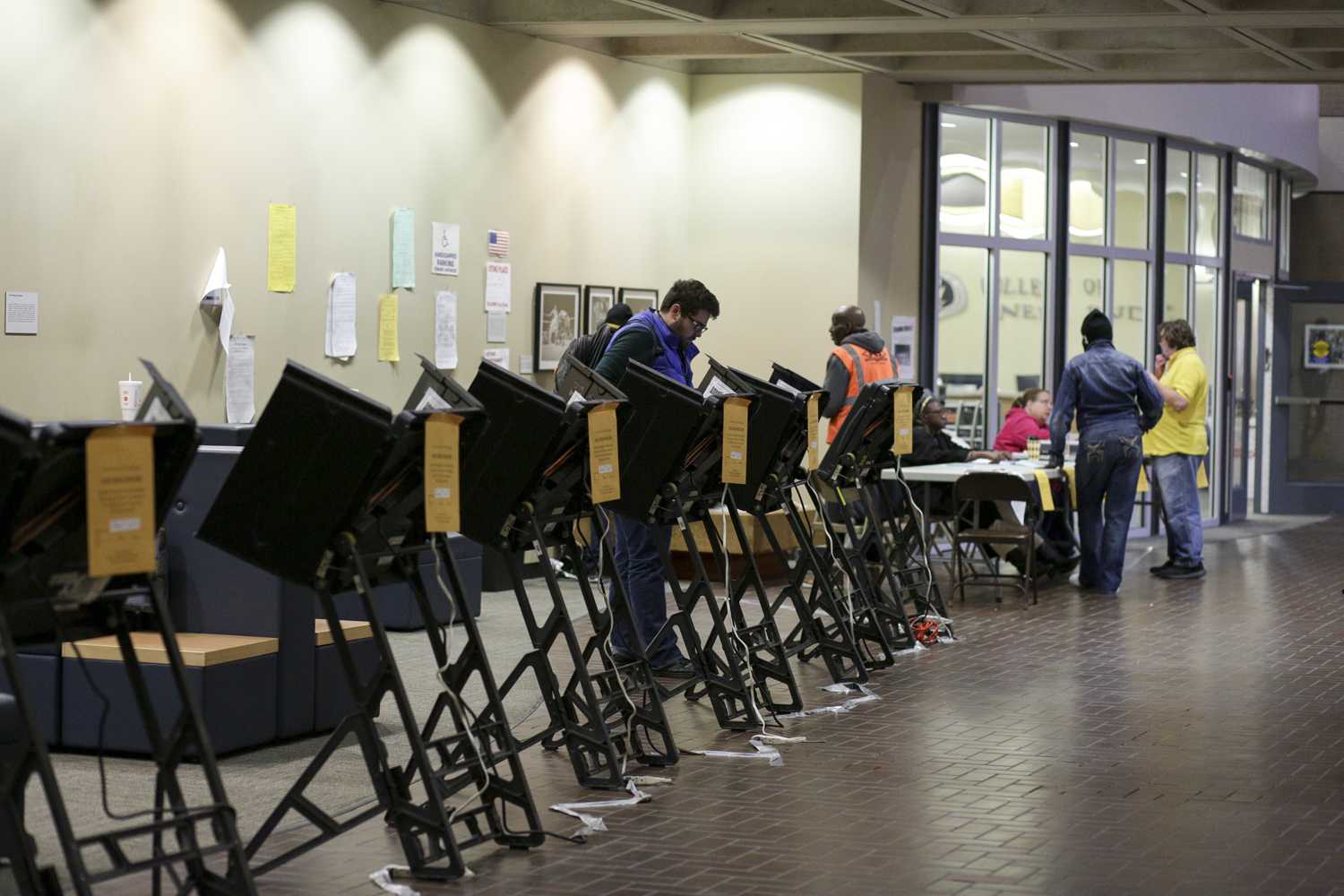Midterm special election question: Allegheny County Children’s Fund


Students and community members voted in Posvar Hall Nov. 7, 2017. About 80 people cast their votes at the polling station.
Today, Americans across the country will vote on representatives for the House, Senate and Governor’s Office. But in Allegheny County, residents will decide on an additional ballot question.
In May, a steering committee including United Way of Southwestern Pennsylvania, the YWCA of Greater Pittsburgh and local nonprofit Allies for Children proposed the Allegheny County Children’s Fund, which would support numerous educational initiatives. In June, they began circulating a petition in hopes of getting the initiative on the midterm ballot. By Aug. 7, it received 63,499 signatures, putting it on the Allegheny County ballot for the 2018 midterm elections.
If passed, a property tax increase of .25 mills will be implemented on residents of Allegheny County — meaning for every $100,000 of assessed value on all taxable real estate, an additional $25 will be taxed annually.
The tax is expected to generate $18 million annually, according to the organization Our Kids. Our Commitment: Allegheny County Children’s Fund Initiative, which will fund early-childhood education, after-school and nutritional-support programs for children in Allegheny County.
Steering committee members have discussed the initiative for the past two years, according to Patrick Dowd, the executive director of Allies for Children.
Since being placed on the ballot, volunteers held door-knocking and coffee-talk events two to three times per week to discuss what this measure would mean for residents of Allegheny County, according to Dowd.
“We aren’t talking to just one side of the political spectrum. When we’re out knocking on doors, we’re targeting people who’ve turned out to vote the most,” Dowd said. “They can be Democrats, independents or Republicans — we’re talking to a wide variety of people.”
If the measure is passed, the Office of the Allegheny County Children’s Fund would be established within the Allegheny County government. This office would oversee fund distribution, evaluate recipient programs’ work, create an annual report available to the public and create a comprehensive evaluation for every five years of the program.
An advisory commission would also be included in the office. According to OKOC, the advisory commission will consist of community volunteers with experience in childcare to provide counsel to the office, but with no decision-making power.
Dowd said volunteer advocates for the fund have received largely positive reactions when knocking on doors, making phone calls and attending events about the initiative.
“People understand that these programs work. Not everybody understands that the money we currently spend on these programs is almost exclusively coming from state and federal sources. People know the value, they know the need, but they didn’t know that they weren’t paying for it,” Dowd said.
According to an email statement from the Office of County Executive Rich Fitzgerald, Fitzgerald is supportive of the fund — but not an increased property tax, which the office said is a “regressive tax” and has the potential to disincentivize improvement and investment.
“The County Executive … believes investing in early education is an important goal and that having children ready for school — in all ways — makes them better prepared and ready for other opportunities down the road,” the email said. “That being said, he is not in favor of raising the property tax to do so. He has frequently spoken about his desire to see the county be given other revenue options to support needs and initiatives such as these, but the county’s only option now is property tax.”
Other local government officials are questioning the need for a property tax increase to provide funding. Allegheny County controller Chelsa Wagner is supportive of the concept of the fund, but she has concerns regarding leadership and oversight.
“I believe that this proposal is really flawed and should serve as the beginning of this discussion rather than the endgame. I believe that county taxpayers are being asked to essentially pay now and let the details be figured out later,” Wagner said. “I don’t think that’s fair, and I particularly have concerns when I compare this to how other funds have been mismanaged in the county.”
Wagner specifically referenced the Clean Air Fund, which takes allocated fines from polluters’ emission violations, according to the Allegheny County Health Department. The fines are used to fund programs that improve air quality, monitor changes in air pollution and educate the public on the air quality in Allegheny County — but according to Wagner, the funds aren’t always used for these causes.
“Instead of $5 million dollars going to kids with some of the worst asthma rates in the county, that money is going to [renovate] county offices. That’s the kind of mismanagement that this amendment could allow,” Wagner said.
Dowd has heard concerns from county residents about how funds will be allocated if the measure passed, specifically if any organizations on the steering committee would receive monetary benefits.
“The overwhelming majority of the organizations on the steering committee consider themselves advocates, not providers. We won’t be getting the money,” Dowd said.
He said he cannot confirm or deny that any members of these organizations would sit on the advisory commission or have involvement with the fund going forward.
“Our main job will be to be the advocates on the outside, just as we are now, to make sure that this fund operates correctly and in the best interest of the kids in the county,” he said.
Dowd said he acknowledges the work school districts and educators put in every day to help children. He said he believes the fund would enhance these efforts.
“These proposed programs are designed to serve kids before they enroll in kindergarten and after the school day ends. We see them as a perfect compliment to the work our school districts are doing, and particularly what our teachers are doing each and every day,” Dowd said.
Several educators in Allegheny County public schools are optimistic about what this fund could mean for their students. Kira Henderson is the principal of Weil Elementary School, a small school serving 186 students in prekindergarten through fifth grade from the Hill District and Oakland areas. Upon hearing about the Allegheny County Children’s Fund initiative, Henderson was excited and hopes that her school could receive funding to create an after-school program.
According to Pittsburgh Public Schools, 90 percent of Weil students are economically disadvantaged, meaning they live at or below the poverty line.
“I would love to have a program that focuses on students that are struggling or just need homework help, or even a tiered after-school program to support students based on their needs. I’m hoping that if the fund goes through, Weil could be impacted in a positive way,” Henderson said.
While many are looking to the future and what the Allegheny County Children’s Fund could mean for them, Dowd is looking to Election Day.
“This is a matter of people showing up to vote. We think that if voters come out, read the question and think about what’s good for our county going forward, this will be a really awesome day for the future of our kids in Allegheny County,” Dowd said.
Recent Posts
‘He’s off to a much faster and better start’: Republicans reflect the second Trump administration’s first two months
Since Inauguration Day Trump’s second term has caused division amongst young Americans. Despite these controversies,…
Who Asked? // Why do we accept bad treatment from people?
This installment of Who Asked? by staff writer Brynn Murawski attempts to untangle the complicated…
What, Like It’s Hard? // Lean on your people
Contributing editor Livia LaMarca talks about leaning on your support networks and gives advice on…
Note to Self // Hot Girl Summer
In the sixth edition of Note to Self, Morgan Arlia talks about how she is…
A Good Hill to Die On // Down to Date and Time
In the latest version of “A Good Hill to Die On,” staff writer Sierra O’Neil…
‘Dress for Success: Closet to Career’ alleviates the stress of building a professional wardrobe
As the end of the spring semester rapidly approaches, many Pitt students find themselves in…

